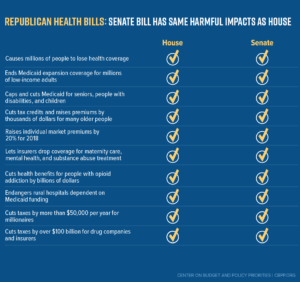The Senate Republican bill to repeal the Affordable Care Act (ACA) would leave 22 million more people uninsured while raising premiums and out-of-pocket costs for tens of millions more — and giving a tax windfall to those at the top. Here are some key analyses and charts that illustrate how the Senate bill would hurt coverage and affordability for millions of Americans.
Leaves Millions More Uninsured
New CBO Estimate: 22 Million More Uninsured Under Senate Republican Health Bill
Similar to its estimates of the House-passed bill, the Senate Republican health bill to repeal the Affordable Care Act would cause 22 million people to lose coverage by 2026 and drive $772 billion in federal Medicaid cuts over the next ten years, the Congressional Budget Office found.
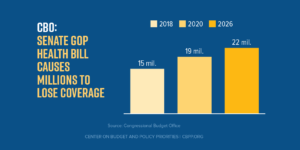
Urban Institute: Huge Coverage Losses in All States Under Senate GOP Bill
The number of uninsured non-elderly people would rise dramatically in every state under the Senate GOP health care bill, new Urban Institute estimates show — more than doubling in 25 states and more than tripling in four states.
Cuts $772 Billion from Medicaid
CBO: More Medicaid Cuts, Fewer Enrollees by 2026 Under Senate Than House Bill
The Senate bill to repeal the Affordable Care Act (ACA), which would effectively end the ACA’s Medicaid expansion starting in 2021 and convert the program to a per capita cap starting in 2020, would cut federal Medicaid spending and enrollment more in 2026 than the House-passed bill, Congressional Budget Office estimates show.
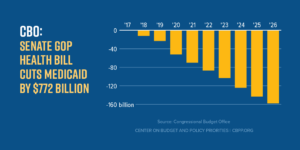
Like the House bill, the Senate health care bill that Senate Majority Leader Mitch McConnell unveiled June 22 would effectively eliminate the Affordable Care Act’s Medicaid expansion in 31 states and the District of Columbia, leaving millions of low-income adults uninsured.
Senate Bill’s Medicaid Cuts Would Be Even Deeper than House Cuts
The Senate health bill would lower the annual increase in state Medicaid funding under a per capita cap to the general inflation rate for all populations starting in 2025, which is well below the House-passed bill’s already inadequate growth rate. That means states would have to absorb much deeper cuts in federal Medicaid funding over the long run than under the highly damaging House bill.
Increases Out-of-Pocket Costs, Impedes Coverage for People Who Buy Insurance Through ACA Marketplaces
CBO: Senate Bill Would Raise Premiums, Deductibles, or Both for Most Marketplace Consumers
Under the Senate Republican health bill, most marketplace consumers would pay more in premiums, deductibles, or both, with older consumers facing the highest cost increases, the Congressional Budget Office reports. And in many cases, they’d be buying insurance that covered fewer benefits and offered fewer protections.
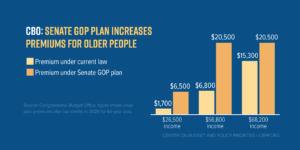
Senate Bill Still Cuts Tax Credits, Increases Premiums and Deductibles for Marketplace Consumers
While the Senate bill’s cuts to tax credits are structured differently and are somewhat smaller on average, their broad consequences would essentially be the same: coverage and care would become much less affordable for millions of people with modest incomes. Moreover, the Senate’s subsidy changes, like those in the House bill, would particularly harm older people, lower-income people, and people in high-cost states.
Cuts Taxes for the Wealthy, While Middle-Income Families Lose
Middle-Class Families Would Face Higher Costs, Worse Coverage Under Senate Health Bill
Alongside the Senate bill’s devastating impact on coverage and well-being for lower-income families, the considerable damage it would inflict on middle-class families has received less attention. The bill would be particularly harmful for older middle-class people, people with pre-existing conditions and other serious health needs, and for middle-class families who depend on Medicaid: families caring for children with disabilities, people with disabilities who rely on Medicaid-funded services to work, and seniors receiving home-based services or nursing home care.
Harsh Tradeoff at Core of GOP Health Bill: Keep Medicaid Expansion or Cut Taxes for Wealthy?
The House-passed bill to repeal and replace the Affordable Care Act, which the emerging Senate Republican health bill is expected to largely resemble, would lavish tax cuts on the wealthy and pay for them by cutting provisions that help millions of people afford health coverage and care.
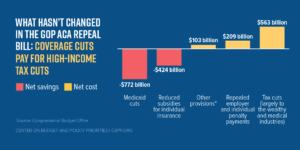
Causes Harmful State Impacts
State Analyses: GOP Health Bills Will Fuel Deep Medicaid Cuts
Both the Congressional Budget Office and a growing number of state-based analyses are concluding that millions of people all over America would lose their Medicaid coverage due to the huge federal Medicaid funding cuts under both the House and Senate bills.
Alaskans Could Still Suffer Most Harm Under Senate Version of GOP Health Plan
The Senate’s changes to the House-passed health bill do not change the fact that the bill would take away coverage from tens of thousands of Alaskans and make coverage worse or less affordable for thousands more. As with the House bill, Alaska may be the single most harmed state under the Senate bill’s policies.
Mirrors House-Passed Health Bill
Senate Health Bill No Better Than House Version
The draft Senate health bill slashes programs that help people get health coverage, using most of the savings to pay for tax cuts for high-income households and corporations.
Tracking Reports About the Emerging Senate Bill to Repeal the Affordable Care Act
The House-passed bill to repeal the Affordable Care Act — the American Health Care Act — would cause 23 million people to lose coverage and make coverage worse or less affordable for millions more. A number of Republican senators initially rejected the House bill and promised to start from scratch in crafting their own version. But the discussion draft from Senate Majority Leader Mitch McConnell would retain the House bill’s most harmful structural features. As a result, the Senate bill would do much the same damage to health care coverage, affordability, and quality.
